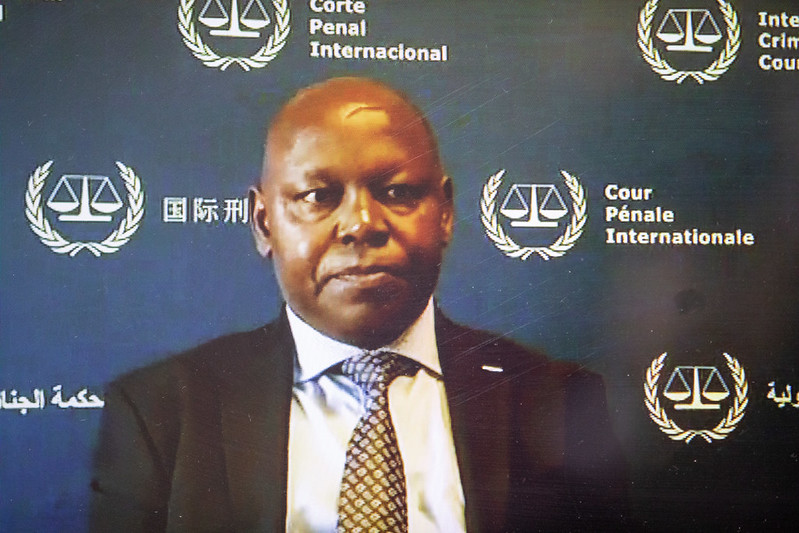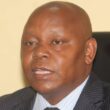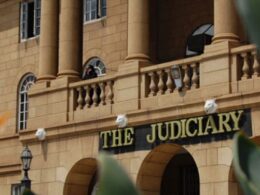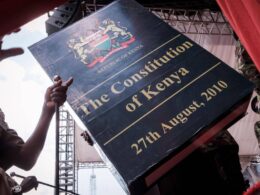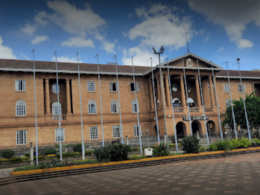By Susan Kendi
Kenyan Lawyer Paul Gicheru is to stand trial after the International Criminal Court (ICC) confirmed the six charges against him, stating there is sufficient evidence that he tampered with prosecution witnesses through bribery and corruption.
The Pre-Trial Chamber V(A) of the ICC delivered the decision on Thursday, July 15, 2021, unraveling that Gicheru influenced eight witnesses in the case against Kenya’s Deputy President William Samoei Ruto and Journalist Joshua Arap Sang.
The witnesses are identified by pseudonyms P-0397, P-0516, P-0613, P-0800, P-0495, P-0536, P-0341 and P-0274.
In the 81-page decision, the Single Judge defines ‘influencing,’ stating that “it may be seen in bribing witnesses, which encompasses any ‘inducement offered to procure illegal or dishonest action or decision in favour of the giver,’ such as paying money, providing goods, rewards, gifts or making promises. Other forms of ‘influencing’ can be seen in pressuring, intimidating or threatening witnesses, or causing injuries aimed at procuring a particular testimony from the witnesses.”
They further defined the word ‘corruptly’ as “the relevant conduct aimed at contaminating the witness’s testimony. “
During the initial appearance, Paul Gicheru denied charges that he bribed or attempted to influence the six prosecution witnesses. Appearing via video link from the ICC Detention Centre, he also confirmed to the Court that he had surrendered himself voluntarily without coercion and at his own expense.
The Court released Gicheru to Kenya on February 1, 2021, with restrictive conditions on his liberty. The Single Judge, Reine Adélaïde Sophie Alapini-Gansou, held Gicheru’s voluntary surrender in his favour, adding that the prosecutor does not oppose his request for interim release.
“In the view of the Chamber, Mr Gicheru’s voluntary surrender demonstrates his concrete willingness to subject himself to the jurisdiction of the Court in relation to the allegations against him,” said Judge Gansou.
The 10 restrictive conditions for interim release is that Gicheru may not only not talk to journalists himself about the case, but also not through his Lawyer, Michael G. Karnavas, and neither of them shall he make any public statements or social media posts on the case.
The other conditions are that Gicheru shall provide financial security of one million Kenyan shillings [$10,000] to the ICC Registrar in the form of cash or bank order, he shall provide copies of his travelling and identity documents, and shall notify the Court of any international travel seven days in advance. Also, he shall surrender himself if required by the Court and appear before it when and where ordered; neither shall he interfere with the investigation nor contact prosecution’s witnesses or victims in the case except through his Lawyer under strict protocols, which includes a decision. Additionally, he must report once a week to the Registrar, provide the Registrar with mobile and telephone numbers, remain active with airtime to be reachable at any time, and reside in a specific location in Kenya for the duration of the proceedings.
Suppose Gicheru fails to comply with any of the conditions; in that case, the Court may revoke the financial security provided to the Court and issue an arrest warrant either at the request of the ICC prosecutor or on its own. The ICC has also invited the Netherlands to provide observations as to the possibility of Gicheru temporarily residing in the Netherlands for the proceedings in the present case before February 26, 2021.
Gicheru surrendered himself to the Dutch authorities on November 2, 2020, five years after the ICC issued an arrest warrant against him and his co-suspect, Philip Kipkoech Bett. The arrest warrant was issued in March 2015.





